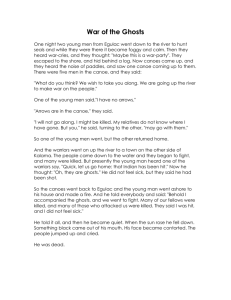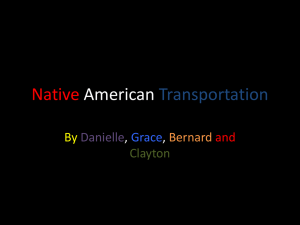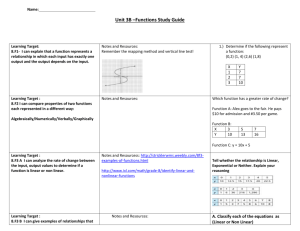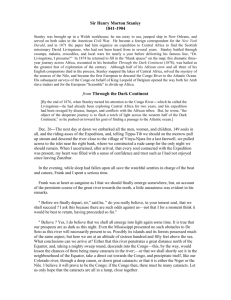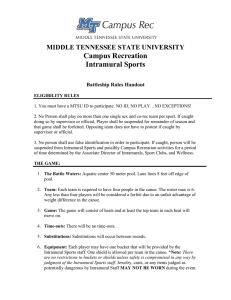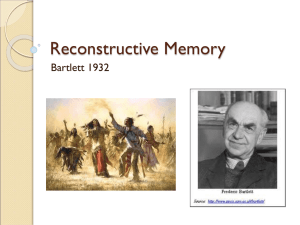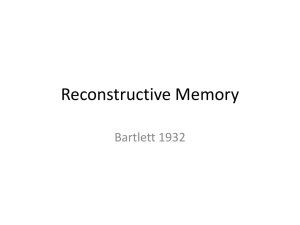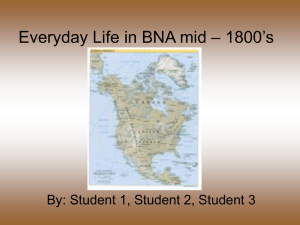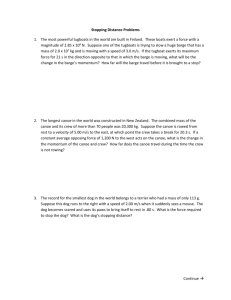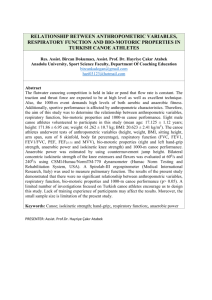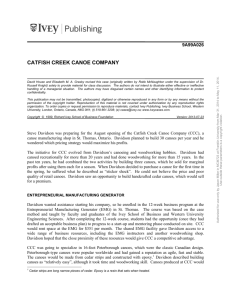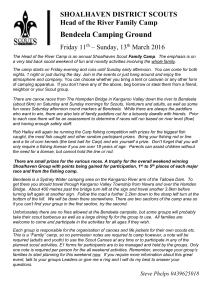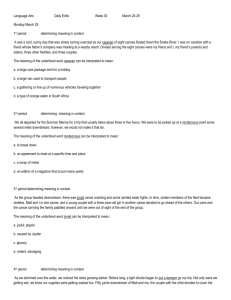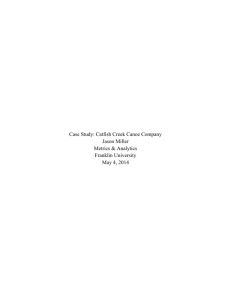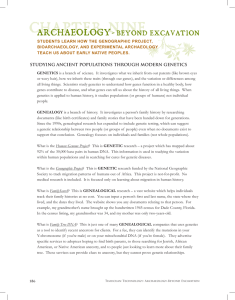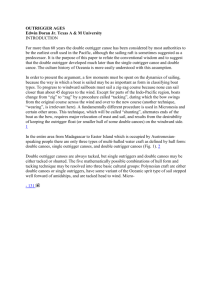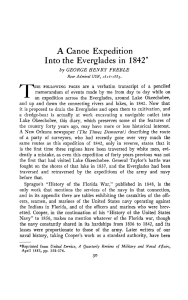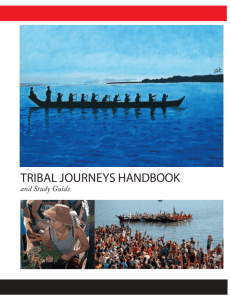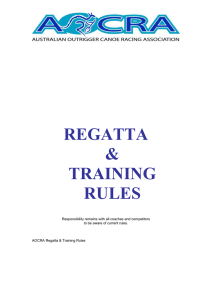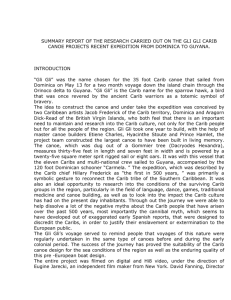History - Meeting on the Congo Viewpoints
advertisement
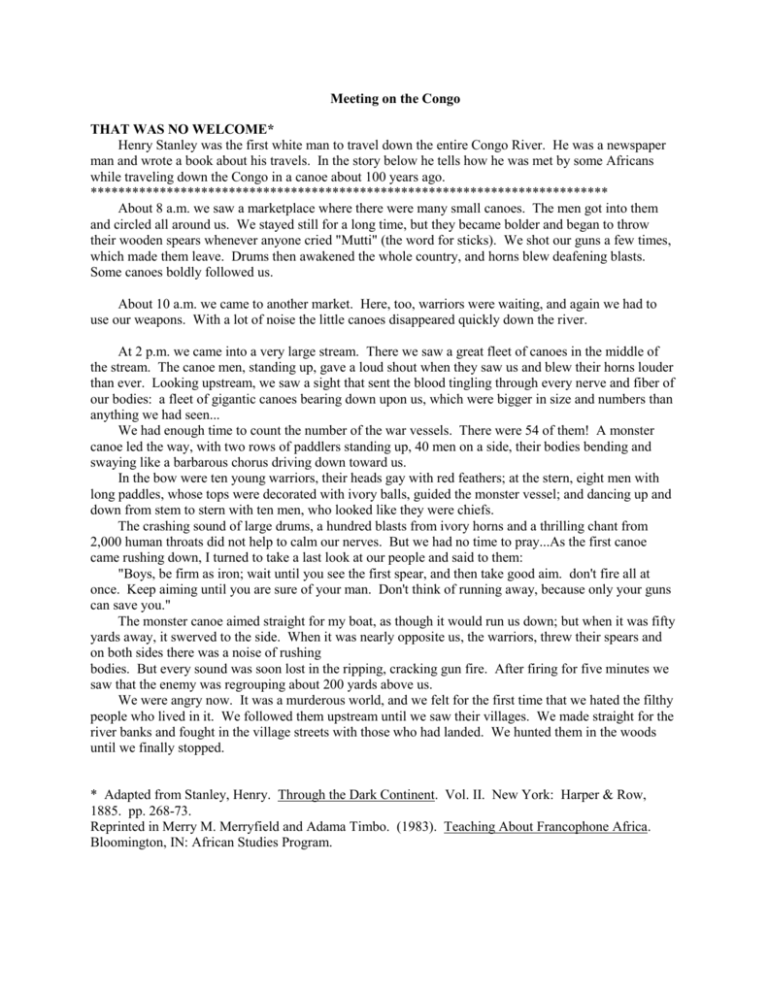
Meeting on the Congo THAT WAS NO WELCOME* Henry Stanley was the first white man to travel down the entire Congo River. He was a newspaper man and wrote a book about his travels. In the story below he tells how he was met by some Africans while traveling down the Congo in a canoe about 100 years ago. *************************************************************************** About 8 a.m. we saw a marketplace where there were many small canoes. The men got into them and circled all around us. We stayed still for a long time, but they became bolder and began to throw their wooden spears whenever anyone cried "Mutti" (the word for sticks). We shot our guns a few times, which made them leave. Drums then awakened the whole country, and horns blew deafening blasts. Some canoes boldly followed us. About 10 a.m. we came to another market. Here, too, warriors were waiting, and again we had to use our weapons. With a lot of noise the little canoes disappeared quickly down the river. At 2 p.m. we came into a very large stream. There we saw a great fleet of canoes in the middle of the stream. The canoe men, standing up, gave a loud shout when they saw us and blew their horns louder than ever. Looking upstream, we saw a sight that sent the blood tingling through every nerve and fiber of our bodies: a fleet of gigantic canoes bearing down upon us, which were bigger in size and numbers than anything we had seen... We had enough time to count the number of the war vessels. There were 54 of them! A monster canoe led the way, with two rows of paddlers standing up, 40 men on a side, their bodies bending and swaying like a barbarous chorus driving down toward us. In the bow were ten young warriors, their heads gay with red feathers; at the stern, eight men with long paddles, whose tops were decorated with ivory balls, guided the monster vessel; and dancing up and down from stem to stern with ten men, who looked like they were chiefs. The crashing sound of large drums, a hundred blasts from ivory horns and a thrilling chant from 2,000 human throats did not help to calm our nerves. But we had no time to pray...As the first canoe came rushing down, I turned to take a last look at our people and said to them: "Boys, be firm as iron; wait until you see the first spear, and then take good aim. don't fire all at once. Keep aiming until you are sure of your man. Don't think of running away, because only your guns can save you." The monster canoe aimed straight for my boat, as though it would run us down; but when it was fifty yards away, it swerved to the side. When it was nearly opposite us, the warriors, threw their spears and on both sides there was a noise of rushing bodies. But every sound was soon lost in the ripping, cracking gun fire. After firing for five minutes we saw that the enemy was regrouping about 200 yards above us. We were angry now. It was a murderous world, and we felt for the first time that we hated the filthy people who lived in it. We followed them upstream until we saw their villages. We made straight for the river banks and fought in the village streets with those who had landed. We hunted them in the woods until we finally stopped. * Adapted from Stanley, Henry. Through the Dark Continent. Vol. II. New York: Harper & Row, 1885. pp. 268-73. Reprinted in Merry M. Merryfield and Adama Timbo. (1983). Teaching About Francophone Africa. Bloomington, IN: African Studies Program. Meeting on the Congo THAT WAS NO BROTHER In the story below King Mojimba, who lived along the Congo River, tells how his people welcomed the first white man they had ever seen. He told this story to a Catholic priest. ************************************************************************ When we heard that the man with white skin was traveling down the river, we were openmouthed with surprise. We stood still. All night long the drums told the strange news--a man with white skin! That man, we said to ourselves, has a white skin. He must have got that from the river kingdom. He is one of our brothers who was drowned in the river. All life comes from the water, and in the water he has found life. Now he is coming back to us. He is coming home. We will prepare a feast, I ordered...We will go to meet our brother and bring him into the village with rejoicing! We put on our ceremonial dress. We got the great canoes. We listened for the gong which would tell us that our brother had arrived on the river. Now he enters the river! We swept forward, my canoe leading, the others following, with songs of joy and dancing, to meet the first white man our eyes had ever seen and to honor him. But as we came near his canoe there were loud sounds, bang! bang! and fire-sticks spit bits of iron at us. We were frightened; our mouths hung wide open and we could not shut them. Things such as we had never seen, never heard of, never dreamed of--they were the work of evil spirits! Several of my men plunged into the water...What for? did they fly to safety? No--for others fell down also in the canoes. some screamed terribly, others were silent--they were dead, and blood flowed from little holes in their bodies. "War! that is war!" I yelled. "Go back!" The canoes sped back to our village with all the strength we could give to our arms. That was no brother! That was the worst enemy our country had ever seen.... *Adapted from remarks of King Mojimba, as told to Father Joseph Fraessle, reprinted here from Heinrich Schiffers, The Quest for Africa, New York: G.P. Putnam's sons, 1957, pp. 196-7. Reprinted in Merry M. Merryfield and Adama Timbo. (1983). Teaching About Francophone Africa. Bloomington, IN: African Studies Program.
